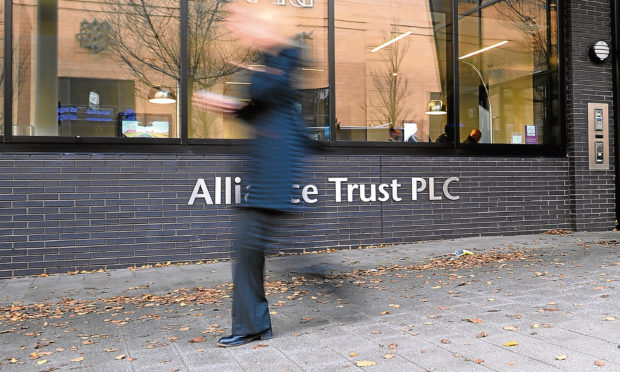The savings arm of Dundee finance giant Alliance Trust turned in a “poor financial performance” last year as it swung into the red.
The downturn saw the group’s board move to write down the fair value of Alliance Trust Savings (ATS) by £23.5 million to £38m, as the division fell to an operating loss of £6.1m before exceptional expenses of more than £13m.
The business is based at Alliance Trust’s headquarters at West Marketgait in Dundee and employs around 300 staff.
An expected £10m gain from the sale of shares in Liontrust – the financial services firm which bought over the group’s other main trading subsidiary, Alliance Trust Investments, last April – did not fully offset the shortfall within ATS.
“ATS has had a challenging year,” group chairman Lord Smith said.
“While the business has continued to attract additional assets and now has more than 110,000 customer accounts, ATS incurred a particularly high level of costs in 2017.
“These principally related to the tranfer of the Stocktrade operations from Edinburgh to ATS’s main centre in Dundee and to steps taken to improve the level of customer service.
“In 2017, ATS generated an operating loss of £6.1m before exceptional expenses. ATS has written down the value of its intangible assets, related to the Stocktrade business, resulting in an exceptional charge of £13.2m.
“After this charge, ATS’s loss for the year was £19.3m.”
The performance of ATS marred the first months of a new fund management regime at the parent Trust.
In April, a new outsourced approach to investment was adopted with the appointment of Willis Towers Watson (WTW) to oversee investments made by a group of eight hand-picked global equity managers.
The move – which relates to more than 90% of the Trust’s assets – was approved by shareholders at last year’s AGM.
In the year to December 31, Alliance Trust produced a Total Shareholder Return of 19.2% and a Net Asset Value total return of 18.5%, an outperformance of its MSCI benchmark’s 13.8%.
A final dividend of 3.29p has been declared, taking the total dividend to 13.16p for 2017 – a 3% year-on-year uplift – and maintaining the Trust’s record of dividend growth into a 51st year.
Since WTW’s introduction in April, the investment portfolio has achieved a total return of 9.8%, 2.2% above its market benchmark.
Deputy chairman Gregor Stewart said: “This is an approach designed to provide outperformance in the long term, but the good news is it is already yielding that performance.
“The other thing I am pleased about is that, going out to speak to existing investors and potential new investors, the (new high conviction) offering is beginning to resonate.”
The new regime produced an outperformance of its benchmark in two of the three quarters since its introduction.
It fell below its benchmark in the final quarter of the year, when international markets were led by strong advances in technology stocks, a sector in which the Trust was “underweight”.
However, the overall performance in the quarter was positive.
David Shapiro of WTW said the Trust could have done better if it had greater exposure to tech stocks in the period, but he said he was “happy” with the start made by the new investment regime.
He said performance had also continued to improve in the first two months of 2018, with the equity portfolio tracking at 2.7% above benchmark despite ongoing market volatility.
Mr Shapiro added: “The portfolio is an equity portfolio so we wouldn’t be able to insulate it from a general market downturn.”
